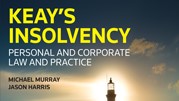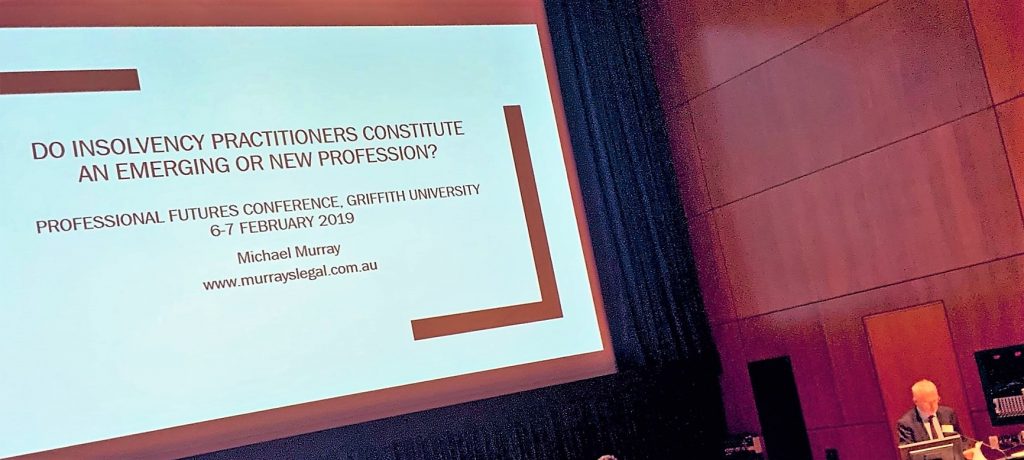Principles of Regulation of Insolvency Practitioners – an international standard

This comment was issued in October 2018; it is re-issued in May 2023, but not updated, for interest. The rather opaque International Association of Insolvency Regulators (IAIR) has issued a public document, the Principles of Regulation of Insolvency Practitioners (IPs), said to have been the subject of internal discussion and negotiation over the last two […]
TIP – The Insolvency Portal

My 2022 versions of the Bankruptcy Act and the Corporations Act retain much of the process and procedure found in my 1914 edition of Williams on Bankruptcy and my 1938 Palmer’s Company Precedents. Right now, in 2022, the numerous precedent letters, notices, checklists and timelines that we use still bear resemblance to Williams and Palmer. […]
Too much independence? a re-issue of my 2016 commentary

My analysis below of the law of insolvency practitioner independence, written in October 2016, is reissued in February 2020 in light of the thesis of Dr Elizabeth Streten and her findings about ARITA Code and what she suggests is a disconnect between the law and the code. Given the findings of Dr Streten about Australian […]
Cafés and restaurants – at a tipping point, in 2018, and now?

In light of current (July 2019) reports about restaurants’ tax [non] compliance, my article of a year ago, 15 July 2018, is re-issued. The Fair Work Ombudsman’s food precincts report[1] – finding that enterprises in three selected foodie streets in Sydney and Melbourne were non-compliant in paying wages to employees, and more, to a […]
An inquiry into a liquidator’s conduct, some many years ago

ASIC has succeeded in obtained a court order for an investigation of the conduct of a liquidator, in relation to liquidations going back to 2001, under former s 536 of the Corporations Act: see now s 90-05 IPSC. See ASIC v Macks No 2 [2019] SASC 17. Mr Macks’ proceedings have a long history, more […]
Keay’s Insolvency – note from the authors – progressive updates since publication

As the authors of Keay’s, and in order to assist readers, we propose to make brief reference to law changes or case law decisions that change, or confirm, what appears in the text as at July 2018. Details follow. A limitation of a law text book is that the law can change at any time […]
Report on targeting of people in financial hardship

The Economics References Committee has issued its report, on time, following its inquiry into ‘Credit and hardship: report of the Senate inquiry into credit and financial products targeted at Australians at risk of financial hardship’, February 2019. The first recommendation is that the ‘government should have a strategy to raise the incomes of low income […]
ASIC’s review of liquidators for 2017-2018 – continued fall in complaints

This ASIC Report 610 has been released, with some interesting points to note, and questions raised. It largely expands on the reporting component in the ASIC annual report under section 136(1)(ca) of the ASIC Act. Overall, there has been a decline over the last 8 years in inquiries and reports of about alleged liquidator misconduct. ASIC […]
Bills subject to scrutiny

That a bill is introduced into parliament after an extensive period of community consultation does not necessarily mean that it will proceed into law without further scrutiny, and even further public input. This scrutiny is decided by the selection of bills committee of the Senate. That committee has decided that the provisions of various bills […]
Litigants in person – issues for judges

Judges have to be careful about making public statements on current issues that may allow claims of bias. There can also be matters in which judges were involved as lawyers before they were appointed that can later lead to bias claims. A Mrs Thomson, a litigant in person (LIP) challenged, unsuccessfully, the independence of the […]
The Hayne Report – lessons for lawyers – Australian Academy of Law event

The relevance of the ‘Hayne Report’ for the legal profession is the subject of the first of the Australian Academy of Law’s events in Sydney for 2019. On Monday 25 March 2019, an impressive panel comprising those from law, ethics and academia will look for the legal lessons to be learned from the Report – […]
Director identity number bill now before parliament

A number of bills broadly concerning the registers of information held by the Commonwealth have been referred to the Senate Standing Committee on Economics for review.[1] The Committee is due to report by 26 March 2019. One – the Commonwealth Registers Bill 2019 – would introduce a director identity number – DIN. This idea, simple […]
Building security of payment laws – the impact of the claimant’s insolvency

Now that we have some consistent security of payment laws across the states and territories protecting building sub-contractors, there is a need for the various Supreme Courts to adopt consistent legal interpretation. Any variation in approach should be the exception. The Courts might have their own jurisdictional limits, but the building industry doesn’t. An exception […]
Litigation ‘for the benefit of creditors’ – really?

How much do unsecured creditors receive out of a liquidation or bankruptcy from any ‘successful’ judgment obtained by the liquidator or trustee under their vast range of recovery remedies – strong remedies that are not available to any other litigant? Less than 5c in the dollar? We could find out. This question has been unasked […]
The future of the insolvency ‘profession’

I was pleased to have given a presentation on the future of the insolvency profession, at Griffith University’s excellent Professional Futures Conference on 6-7 February 2019. This is my brief account, with some questions about professionalism following. My talk examined whether insolvency was in fact a profession, or an emerging one, or an industry. The […]
Assessment of liquidators’ remuneration, with help from a band of experts

The decision of Justice Besanko of the Federal Court in Lock, in the matter of Cedenco JV (No 2) [2019] FCA 93 mainly concerns the remuneration of liquidators. In a broader context, the case involves the conduct of liquidations in Australia and overseas, and the work performed and remuneration claimed, and the inadequacies of the […]
Insolvency administrator’s lack of attention to the sale of complex assets

A UK insolvency administrator has been found to have acted in breach of his duties to a broadcasting company, some 8 years after the conduct in question, in an action brought by the company’s liquidators. Compensation exceeding £740,000 was ordered. The breaches involved his conduct in selling the company’s assets, in particular its Electronic […]
Coshott – a field of study?

Robert Gilbert Coshott was made bankrupt on 7 November 2008: see Shipton Lodge Cobbitty Pty Ltd v Coshott (No.2) [2008] FMCA 1552. There are then 374 cases involving the name Coshott on Austlii, whether one and the same as Robert Gilbert I have not checked, but I assume most are; and a few before. The […]
Last minute attempts to avoid a business being liquidated

When directors appoint a voluntary administrator the day before their company is before the court on a creditor’s winding up application, a certain scepticism exists that they are merely seeking to stall for time and delaying the inevitable. At the same time, the focus of a pending court winding up order is a real prompt […]
Practitioner’s bankruptcy registration cancelled, and liquidator registration indefinitely suspended

A bankruptcy disciplinary committee has issued its reasons for deciding to cancel the registration of a trustee in bankruptcy, based on his misconduct in a matter in which he was a liquidator: decision under s 40-45 in the matter of David Leigh, 31 January 2019. It appears that the trustee, Mr Leigh, had admitted to […]
Hayne Report – banks and receivers and agricultural enterprises

The Hayne Royal Commission declined to examine the conduct of receivers appointed by banks, in particular over agricultural enterprises. Nevertheless, comments and recommendations in the Final Report[1] (Report) address concerns about how banks have handled non-financial farming enterprises. National farm debt mediation The Report for one thing recommends a national farm debt mediation scheme, which […]
The costs and time in administering justice

Newspaper analyses of the work of judges by reference to numbers of matters heard, words written and time taken can be overly and unfairly simplistic, but they are at least some publicly accessible source by which the operation of the judicial system can be assessed. The difficulty is that the more substantial analyses behind and […]
Bad timing? or will Euclid save the day?

Calculation of time limits in law should be straightforward but judges have taken us to the mathematics of Euclid and beyond in deciding whether a bankruptcy or liquidation can take place at a point in time of a day before the first instant of that day. Time limits are important in law because a person […]
Trends in personal insolvency given to Senate committee

Representatives of the personal insolvency law administrator – AFSA – appeared on 24 January 2019 before the Economics References Committee examining credit and financial services targeted at those at risk of financial hardship. AFSA presented useful and interesting data – numbers and trends – paraphrased as follows. Bankruptcy and debt agreements Bankruptcy is the most […]

